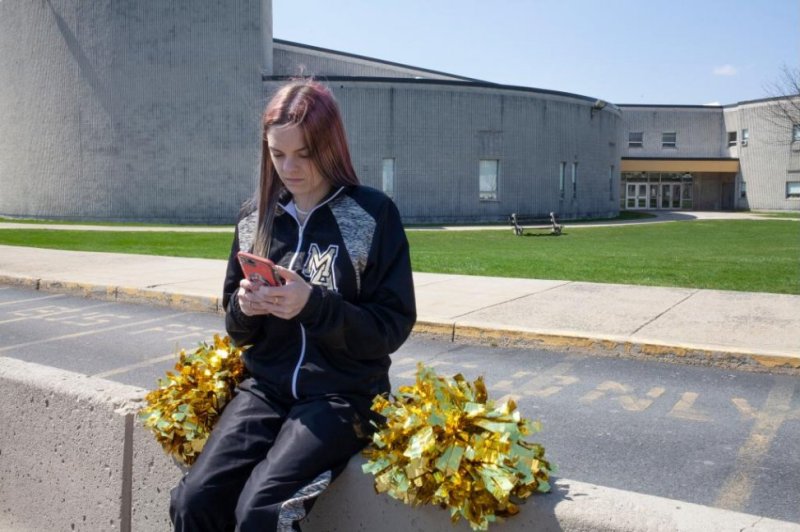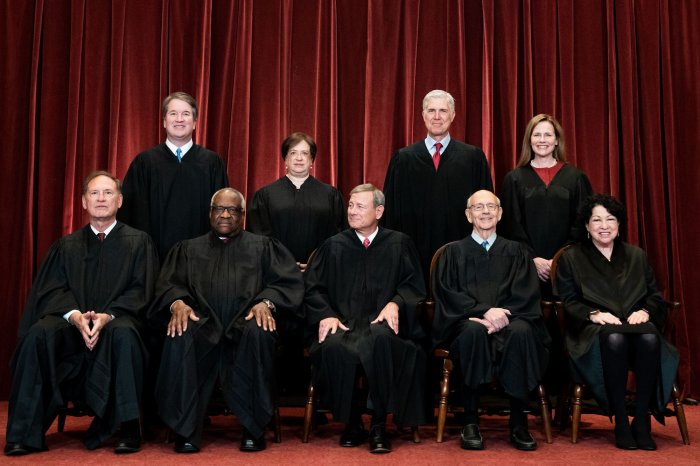Brandi Levy, who was upset that she didn't advance from the junior varsity to the varsity cheerleading squad, was punished by her school after sending a profane Snapchat to 250 friends while she was hanging out at a local convenience store on a Saturday in 2017. Photo by Danna Singer/via ACLU
June 23 (UPI) -- In a key freedom of speech case, the U.S. Supreme Court on Wednesday ruled in favor of a former Pennsylvania cheerleader who sued her high school when she lost her spot on the squad over an obscene social media post.
In the 8-1 ruling, the high court decided that Mahanoy Area High School was wrong when it suspended Brandi Levy over the social post. Levy was 14 at the time and made the post, while off-campus, in a fit of anger over not making the school's varsity cheer squad.
After Levy made the post, as a freshman in 2017, Mahanoy coaches decided that she'd broken team rules that required her to show respect for others.
Wednesday, the Supreme Court ruled the school's actions to suspend her from the junior varsity team for a year violated Levy's First Amendment rights.
The justices considered whether a 1969 decision that allowed public schools to regulate certain speech applied to this case, since Levy's post occurred away from the school.
"Off-campus speech will normally fall within the zone of parental, rather than school-related responsibility," Justice Stephen Breyer wrote for the majority.
"From the student speaker's perspective, regulations of off-campus speech, when coupled with regulations of on-campus speech, include all the speech a student utters during the full 24-hour day," he added. "That means courts must bemore skeptical of a school's efforts to regulate off-campus speech, for doing so may mean the student cannot engage in that kind of speech at all.
"When it comes to political or religious speech that occurs outside school or a school program or activity, the school will have a heavy burden to justify intervention."
The court also called public schools in the United States "nurseries of democracy."
Another point made by the high court ruling is that Levy's post didn't identify the school or target anyone with vulgar language and was only circulated among Levy's social followers.
The lone dissenting justice was Clarence Thomas.
"Using broad brushstrokes, the majority outlines the scope of school authority. When students are on campus, the majority says, schools have authority in loco parentis -- that is, as substitutes of parents -- to discipline speech and conduct," he wrote.
"Off campus, the authority of schools is somewhat less. At that level of generality, I agree. But the majority omits important detail. What authority does a school have when it operates in loco parentis? How much less authority do schools have over off-campus speech and conduct? And how does a court decide if speech is on or off campus?"
Lower appellate courts sided with Levy, which led to her reinstatement on the Mahanoy cheer team. The school district appealed those rulings to the Supreme Court.
Members of the U.S. Supreme Court pose for a group photo at the court in Washington, D.C., on Friday. Seated, from left to right, are Associate Justices Samuel Alito and Clarence Thomas, Chief Justice John Roberts and Associate Justices Stephen Breyer and Sonia Sotomayor. Standing, from left to right, are Associate Justices Brett Kavanaugh, Elena Kagan, Neil Gorsuch and Amy Coney Barrett. Pool Photo by Erin Schaff/UPI |
License Photo
















